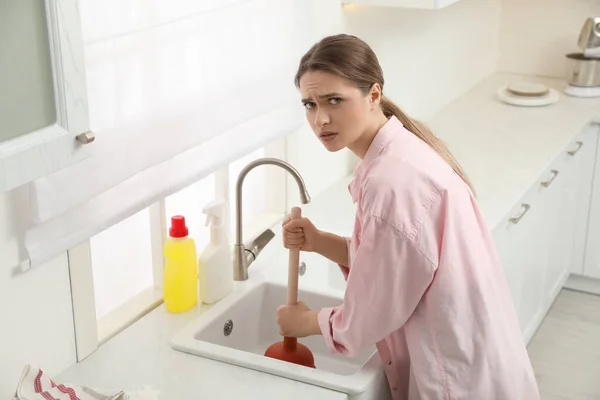Why Do Drains Get Blocked? Essential Prevention Tips for Homeowners
Few household issues are as disruptive and frustrating as a blocked drain. The slow gurgle, the pooling water, the foul odours—they’re all signs of a problem that needs immediate attention. While it’s easy to call in an expert when a blockage occurs, understanding the underlying causes of drain issues can empower homeowners to take proactive steps, preventing costly and inconvenient plumbing emergencies before they even start.
At Drainage & Plumbing LTD, we pride ourselves on being the leading experts in drainage and plumbing services across South East England. From Croydon to Guildford, and everywhere in between, our team is committed to delivering fast, reliable, and professional solutions 24/7. But before you need our emergency services, let’s explore what typically leads to those dreaded drain blockages and, more importantly, how you can prevent them.
Common Culprits: What Exactly Clogs Your Drains?
Understanding the enemy is the first step in winning the battle against blocked drains. Most blockages aren’t sudden mysteries; they’re the result of a gradual accumulation of common household waste.
Grease and Fat Buildup: The Silent Menace
Perhaps the most insidious culprit in kitchen drain blockages is the seemingly harmless act of pouring grease, oil, or fat down the sink. While liquid when hot, these substances cool as they travel through your pipes, solidifying and sticking to the inner walls of your drainage system. Over time, these sticky layers accumulate, narrowing the pipe’s diameter and acting as a magnet for other debris.
- How it happens: After cooking bacon, frying chicken, or even disposing of greasy sauces, people often pour the leftover liquid fats down the drain. This also includes butter, cooking oil, shortening, and even food scraps that contain high levels of fat.
- The impact: This sticky buildup significantly reduces the flow capacity of your pipes. It also traps food particles, soap scum, and other waste, accelerating the formation of a stubborn, often odorous, blockage that can be incredibly difficult to remove without professional tools.
Hair and Soap Scum: The Bathroom’s Nemesis
Bathrooms are prime locations for drain blockages, and hair, in combination with soap scum, is the primary offender. Hair, whether from showering, shaving, or even pet grooming, readily washes down drains. Once inside the pipes, it acts like a net, catching and tangling with other debris.
- How it happens: Every time someone showers, bathes, or even washes their hands, strands of hair, pet fur, and residue from bar soaps and shampoos are washed into the drain.
- The impact: Soap scum, a sticky residue formed when soap reacts with minerals in hard water, adheres to pipe walls. This sticky layer acts as a binding agent for hair, creating dense, fibrous clumps that can quickly form a formidable blockage. Over time, these blockages become extremely resistant to conventional drain cleaners and require mechanical removal.
Food Waste (Beyond Grease): The Kitchen Sink’s Burden
While grease is a major player, other food waste contributes significantly to kitchen sink blockages, even if you have a garbage disposal. Disposals are designed to break down food into smaller particles, but they don’t liquefy everything. Many common food items can cause problems.
- How it happens: Coffee grounds, eggshells, fibrous vegetables (like celery or potato peels), fruit pits, and even small pasta or rice grains can accumulate. These items, especially coffee grounds and eggshells, don’t fully dissolve and create a gritty sludge that clings to pipe walls, especially when combined with grease.
- The impact: This accumulation gradually constricts the pipe’s interior, leading to slow drains and eventually complete blockages. Compostable items can also start to decompose inside the pipes, leading to unpleasant odours.
“Flushable” Wipes and Hygiene Products: The Plumbing Industry’s Headache
Despite labels that claim “flushable,” most wipes (including baby wipes, cleaning wipes, and even many so-called “flushable” personal hygiene wipes) do not break down in water like toilet paper. They maintain their integrity, leading to severe blockages in toilets, sewer lines, and municipal wastewater systems.
- How it happens: Many consumers, misled by marketing, flush these wipes down the toilet. Other non-dissolvable items, such as paper towels, cotton balls, dental floss, cotton swabs, and feminine hygiene products, are also frequently flushed.
- The impact: These items snag on pipe imperfections, accumulate rapidly, and form incredibly tough, often massive, clogs. These blockages can affect not only your home’s plumbing but also lead to costly sewer line issues, potentially requiring excavation to resolve.
Foreign Objects: The Accidental and the Deliberate
Sometimes, blockages are caused by objects that simply shouldn’t be in the drain. These can be accidental drops or, particularly with children, deliberate attempts to flush items down the toilet or sink.
- How it happens: Small toys, jewellery, bottle caps, toothbrushes, disposable razors, and even excessive amounts of toilet paper can find their way into drains.
- The impact: Unlike organic matter that might eventually break down, foreign objects create immediate, hard blockages that completely obstruct water flow. These often require manual retrieval or professional snaking to dislodge.
Mineral Buildup (Hard Water): The Invisible Culprit
In areas with hard water, minerals like calcium and magnesium are present in high concentrations. Over time, these minerals can precipitate out of the water and form a hard, crusty deposit known as limescale on the inside of pipes.
- How it happens: As hard water flows through pipes, minerals adhere to the surfaces, building up layer by layer, especially in hot water pipes and areas with frequent water flow.
- The impact: Similar to grease, mineral buildup gradually reduces the internal diameter of pipes, restricting water flow and increasing the likelihood of other debris getting caught and forming a blockage. This can also reduce water pressure throughout your home.
Tree Roots: Nature’s Intrusive Problem
For outdoor drains, sewer lines, and older homes, tree roots are a significant and often very damaging cause of blockages. Roots are naturally drawn to water sources and, if there are any tiny cracks or loose joints in your underground pipes, they will find their way in.
- How it happens: Fine tree roots seek out the moisture and nutrients found within sewer and drain pipes. Once inside, they grow and expand, forming a dense network that can completely fill and eventually crush the pipe.
- The impact: Tree root intrusion leads to severe blockages, slow draining, and eventually, pipe cracks or collapses. This type of blockage typically requires specialized equipment like hydro-jetting or even excavation to resolve, making it one of the most costly drain problems.
Structural Issues and Wear and Tear: The Ageing Plumbing System
Sometimes, the cause of recurring blockages isn’t what you put down the drain, but the condition of the drain itself. Older plumbing systems, or those subjected to ground shifts, can develop structural problems.
- How it happens: Pipes can corrode, crack, collapse, or sag over time. Sagging pipes, for instance, create bellies where water and waste can pool, allowing debris to settle and accumulate. Misaligned pipe joints can also catch debris.
- The impact: These structural flaws impede the natural flow of water, making the drainage system highly susceptible to blockages. Such issues usually require professional diagnosis, often with CCTV drain surveys, and potentially extensive repairs or pipe replacement.
Prevention is Key: Actionable Tips Every Homeowner Should Know
While knowing the causes is important, taking proactive steps is what truly saves you time, money, and hassle. Here’s how you can significantly reduce your risk of drain blockages.
Be Mindful of What Goes Down the Drain
This is the golden rule of drain health. What you dispose of day-to-day has the biggest impact.
- Dispose of Grease Properly: Never pour cooking oil, fat, or grease down any drain. Instead, pour it into an old container (like a jar or coffee can), let it solidify, and then dispose of it in the trash. Wipe greasy pans with a paper towel before washing.
- Scrape Plates Before Washing: Before rinsing dishes, scrape all food scraps into the bin or compost. Even small particles can accumulate over time.
- Trash “Flushable” Wipes and Hygiene Products: The toilet is designed only for human waste and toilet paper. All other items, including so-called “flushable” wipes, paper towels, cotton balls, dental floss, and feminine hygiene products, belong in the trash bin.
- Use Drain Screens/Strainers: Install drain screens or strainers over all your drains (kitchen sinks, bathroom sinks, showers, and bathtubs). These inexpensive devices catch hair, food particles, and other debris before they can enter your pipes. Remember to empty and clean them regularly.
Regular Maintenance for Healthy Drains
A little routine maintenance can go a long way in keeping your pipes clear.
- Hot Water Flush: Periodically, especially after using your kitchen sink, flush your drains with very hot water (or boiling water). This can help melt and flush away minor grease accumulations. For a deeper clean, you can follow it with a squirt of dish soap, then more hot water.
- Baking Soda and Vinegar: For a natural and environmentally friendly drain freshener and minor clog preventative, pour half a cup of baking soda down the drain, followed by half a cup of white vinegar. Let it sit for 20-30 minutes (you’ll hear fizzing as the reaction occurs), then flush with hot water. This can help dislodge minor clogs and neutralise odours. Avoid using chemical drain cleaners, as they can be corrosive and damage pipes over time.
- Check Outdoor Drains: Regularly clear leaves, dirt, and debris from outdoor drains, gutters, and downspouts. This prevents rainwater runoff from carrying blockages into your main sewer lines.
Consider a Water Softener (for Hard Water Areas)
If you live in an area with particularly hard water (common in many parts of South East England), investing in a water softener can significantly reduce mineral buildup in your pipes and appliances, extending their lifespan and improving water flow.
Professional Drain Cleaning: The Proactive Solution
Even with the best preventive measures, some buildup is inevitable. That’s where professional drain cleaning comes in. Think of it like a regular service for your car – it prevents bigger problems down the line.
- Why it’s important: Professional cleaning, particularly high-pressure water jetting (hydro-jetting), thoroughly scours the inside of your pipes, removing years of accumulated grease, mineral deposits, hair, and other debris that DIY methods simply can’t touch.
- When to consider: If you notice recurring slow drains, occasional foul odours coming from your sinks, or if your home is older, a periodic professional drain clean every few years can be a wise investment. It helps maintain optimal flow and prevents major blockages from forming. Drainage & Plumbing LTD specialises in this service, using state-of-the-art equipment to ensure a complete and lasting clean.
Educate Your Household
Drain health is a family affair. Ensure everyone in your home, especially children, understands what can and cannot go down the drains and toilet. Simple rules, clearly communicated, can prevent many common blockages.
When Prevention Isn’t Enough: Trust the Experts at Drainage & Plumbing LTD
Despite your best efforts, sometimes blockages occur, or you might encounter a plumbing issue that’s beyond simple DIY fixes. Knowing when to call in the professionals can save you from exacerbating the problem and incurring greater costs.
Signs You Need Professional Help:
- Recurring Blockages: If a drain keeps blocking after you’ve tried to clear it, it’s a sign of a more serious underlying issue, such as a deep clog, tree root intrusion, or a structural problem.
- Multiple Slow Drains: If more than one drain in your home is slow (e.g., your kitchen sink and a bathroom sink), it often indicates a blockage in your main sewer line, which requires professional attention.
- Foul Odours from Drains: Persistent sewage smells or rotten odours can indicate a buildup of decomposing organic matter in your pipes or, worse, a sewage backup.
- Water Backing Up: If water backs up into a sink, toilet, or shower when another fixture is used, it’s a clear sign of a significant blockage in your main drainage system.
- Gurgling Noises: Unusual gurgling sounds coming from your drains or toilet can indicate trapped air caused by a blockage disrupting the normal flow of water and air in the pipes.
Why Choose Drainage & Plumbing LTD?
When these signs appear, you need a reliable and swift solution. Drainage & Plumbing LTD stands out as the premier choice for homeowners and businesses across South East England for several compelling reasons:
- 24/7 Emergency Service: Drains don’t care what time it is. Our team is on call around the clock, ready to respond to your urgent drainage problems quickly and efficiently, any time, any day. We aim to arrive within 60 minutes wherever you are in our service area, minimising disruption with fast, effective solutions.
- Highly Trained & Certified Technicians: Our team is comprised of experienced, fully equipped, and certified drainage engineers. They use the latest technology, including advanced leak detection equipment and high-pressure water jets, to accurately diagnose and resolve issues while adhering to strict industry standards. They are skilled at tackling even the toughest blockages with a professional attitude and a friendly approach.
- Local Experts, Wide Coverage: We proudly serve South East England within a 25-mile radius, ensuring rapid response times to a comprehensive list of towns including Croydon, Sutton, Wallington, Coulsdon, Banstead, Bromley, Mitcham, Epsom, Reigate, Redhill, Leatherhead, Kingston upon Thames, Wimbledon, Richmond, Caterham, Guildford, Crawley, and Haywards Heath. We are your local drainage solution.
- Comprehensive Drainage & Plumbing Services: From unblocking toilets, sinks, and showers to fixing blocked or broken drains, removing stubborn grease and fat buildup, diagnosing and solving all types of drainage problems, performing regular drain cleaning, and providing advanced leak detection, we cover all aspects of drainage and plumbing needs.
- Customer Satisfaction Guaranteed: At Drainage & Plumbing LTD, customer satisfaction is at the heart of everything we do. We go above and beyond to deliver service you can trust, ensuring clear explanations, transparent pricing, and guaranteed satisfaction with every job. Our process is simple: fast, honest, and effective. We fix most problems on the spot with no surprises or hidden costs.
Areas We Serve
We proudly provide drainage and plumbing services across South East England, within a 25-mile radius of Croydon. Our service areas include:
- Sutton
- Wallington
- Coulsdon
- Banstead
- Bromley
- Mitcham
- Epsom
- Reigate
- Redhill
- Leatherhead
- Kingston upon Thames
- Wimbledon
- Richmond
- Caterham
- Guildford
- Crawley
- Haywards Heath
No matter where you are in the region, Drainage & Plumbing LTD is just a call away.
📞 Get In Touch Today
Need help now or want to book a routine inspection?
- 📍 Serving: South East England
- 📧 Email: support@drainage-plumbing.co.uk
- 📱 Phone/WhatsApp: 07771 200075
- 🌐 Website: https://drainage-plumbing.co.uk
We respond within 2 hours. Don’t wait until a small blockage turns into a big problem—contact us today!
Drain Cleaning South East England | 24/7 Drain Unblocking Servise
Conclusion
Understanding what causes blocked drains and implementing simple preventive measures can significantly improve the health of your home’s plumbing system. By being mindful of what goes down your drains and performing routine maintenance, you can avoid many common issues. However, when a blockage is stubborn, recurring, or indicative of a more serious problem, don’t hesitate to call in the experts.
Drainage & Plumbing LTD is your trusted partner for all drainage and plumbing needs across South East England. With our 24/7 emergency service, experienced technicians, and commitment to excellence, we’re always ready to assist you.



2 responses